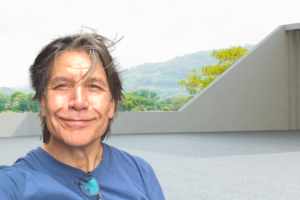Born in Toronto, Canada, Joseph Blasioli was educated at St. Michael’s College at the University of Toronto, and then Ryerson University where he earned a Bachelor of Fine Arts in Film and Photography.
He began his career as an assistant editor before next freelancing as a writer, director, and producer. Starting in 1992, he made acclaimed feature-length documentaries ‘Blast’em,’ and ‘The Last Round: Chuvalo vs Ali’ as well as award winning non-fiction television such as ‘Popstars,’ ‘A Year in the Life of the NHL,’ and ‘Canada’s Handyman Challenge,’ largely through his company Firvalley Productions (firvalleyproductions.com), formed in 2005.
Now a veteran of more than thirty-five years in the industry, he continues to create, produce, and direct many successful programs and series across multiple formats, earning multiple awards and nominations for Gemini and Canadian Screen Awards, Canada’s equivalent to the Emmy.
What do you currently do at your Firvalley Productions?
I have multiple roles, but the primary ones are creative in nature. As Executive Producer and Head of Development at Firvalley Productions, that means actively cultivating current and future production ideas and concepts, writing pitches, liaising with broadcast executives, setting up meetings, and staying on top of trends and needs for a host of formats and programming genres. Beyond that, I like to stay directly involved in our current production slate, being ‘hand on’ with everything from pre-production through to post-production and promotion.
What was the inspiration behind your business?
To better meet, support, and monetize the growing demand for my creative skill set and talents. The company is essentially a mechanism through which to realize ideas, keep them ‘in house,’ and help foster an environment to create top-shelf content in an efficient and cost-effective manner. Although I was able to do that as a freelancer for a good portion of my career, once I teamed up with Maria Pimental to create Firvalley Productions, all kinds of wonderful new doors opened up.
What defines your way of doing business?
Trust, commitment, and quality. These are the values that I cherish above all others, and I strive to conduct all my business in accordance with them.
What keys to being productive can you share?
First and foremost for me it’s been the ability to maintain a passion and curiosity about what’s happening or changing in the industry. Then, once again, I would have to answer trust, commitment, and the promise of quality. Without trust in my team, I would end up micro-managing every little detail of our productions–which is no way to get anything meaningful accomplished. Without commitment to delivering on our promise or expectations, we wouldn’t last very long. In this business, all comfort or respect for what we do radiates from the top, so sincerity is important. The high quality expected of our productions is a direct result of what we’ve already done and the hunger or desire to always improve upon.
Tell us one long-term goal in your career.
Right now, we specialize in documentary films and reality-based television programs, but I’d love to move into scripted content and programming. To be honest, it’s not as big of a leap as you might think, and I expect it to happen within a year or two, if not sooner
What would you tell your younger self?
Stay flexible and don’t take things too personally—good or bad.
What’s the most valuable lesson you’ve learned through the course of your career?
Don’t chase. Lead. And the most effective way of leading is by nurturing your own ideas as best you can. There is no shortage of people in this business who spend their careers looking to emulate the next big trend—but that’s chasing, not leadership, and it is the path of creative bankruptcy. As the executive and head of all things creative of a production company, I’ve learned to place great faith in my own ideas, cultivate them with the utmost care, and fight for them when necessary.
What are some of your favorite things to do outside of work?
I love to read and travel. Outside of that, I think it’s very important to keep healthy and active.
How would your colleagues describe you?
I like to think my colleagues would describe me as perceptive, sensitive, and witty.
How do you maintain a solid work life balance?
I think I address the work life balance issue by not separating the two aspects too definitively. I think it’s much more important and healthy to break down barriers rather than construct new ones. If some family or friends want to visit me at work and see how a production is made, I invite them to come and watch! Maybe we’ll have lunch in between things. By the same token, if someone needs to talk to me about work while I’m relaxing at home (this business usually doesn’t observe the typical 9am-5pm schedule), I will have that conversation. I like to think that my work and personal life are integrated in a harmonious way.
What is one piece of technology that helps you the most in your daily routine?
This is a bit of a boring answer, but it’s definitely my desktop computer. At this point, I would be professionally crippled without it. Well, maybe not crippled, but many daily tasks would take a heck of a lot longer to organize and accomplish.
What are some of the keys to your success?
The biggest keys to my success have been intangibles, I think. Things like communication skills and self-confidence have been instrumental in completing projects and achieving my goals.
Who has been a role model to you and why?
My peers, many of whom are my friends. There are too many to name, and I would hate to leave anyone out, so let’s just say this: They are, in myriad different ways, inspiring.
What is one piece of advice that you have never forgotten?
You sleep better when you’ve done your absolute best, regardless of the outcome.
How do you measure success?
There are a few different ways that I measure success. The first is with varied experiences. I love meeting new people, travelingto new locations, eating and drinking things that are brand new to me, and just generally absorbing aspects of cultures that I’m not acquainted with yet. So, if I experience new things, to me, that’s a great way to measure success. My second measure of success goes hand-in-hand with the first, and that is the creation of a wealth of personal memories; those are more precious than anything else in this world. Finally, there is financial security—the classic measurement of success. Although it is not on the top of my list, it is nonetheless necessary, as well as being a reasonably objective way to gauge how well I’m doing professionally.
What advice would you give to aspiring to succeed in your field?
Nothing happens on its own. It’s up to you to realize your dreams.
Read more:
Getting to Know You: Joseph Blasioli, Documentary Filmmaker, Director, and Television Producer
















